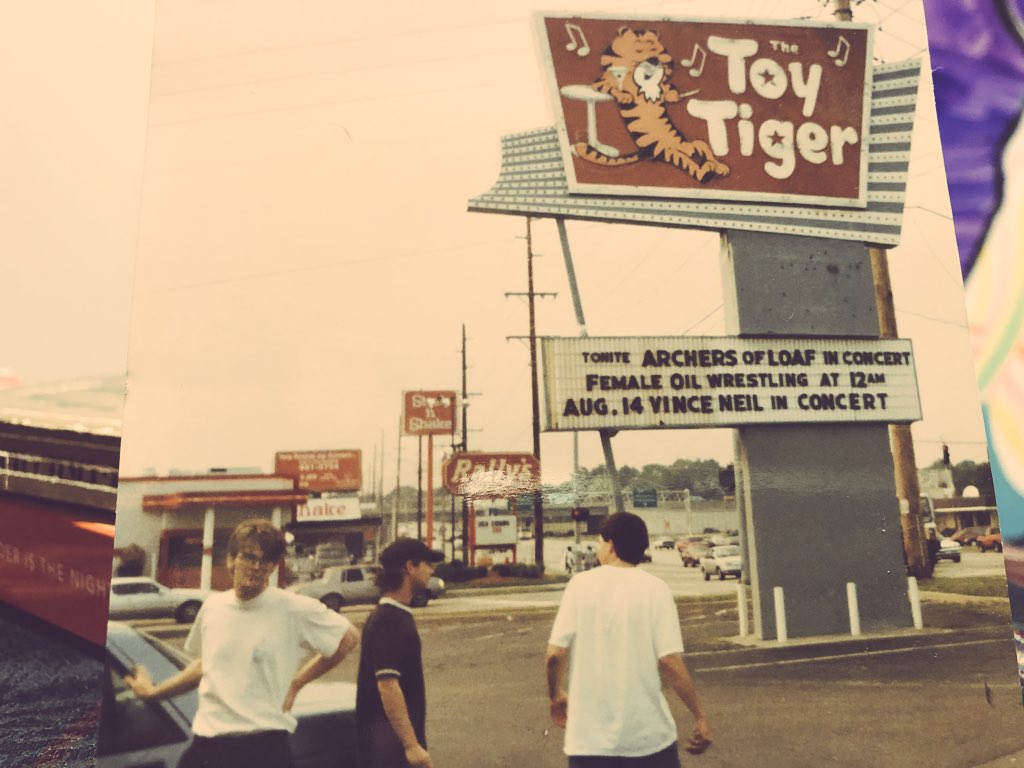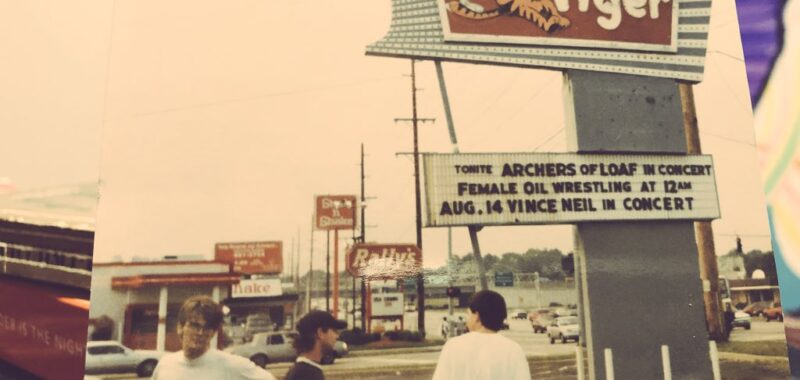
Photograph courtesy of J. D. Daniels.
When I was seventeen, my father put me in charge of his black Nissan Hardbody pickup. Its driver’s-side brake light got smashed when I backed into a dumpster. I sealed it with red translucent lens-repair tape. (Can you say the word translucent if you are talking about your truck?)
My truck kept me out of the car-pool game, since it really seated only two. In the summertime I was happy to drive other kids around in the back on short jaunts from party to party, but nobody was going to ride sixteen miles one way from Fern Creek to our high school downtown in the back of a truck, on the Gene Snyder Freeway and I-65.
So I spent a lot of time in the cab of the truck by myself, smoking dope and listening to this or that cassette tape. At lunchtime, I’d walk out the side door of my high school to where I’d parked on Second Street by the art school annex, and Danielle and Allison and I would cozy up in the cab of my truck and roll one and do shotguns and listen to the Breeders. Sometime in 1992, John Scofield’s Grace Under Pressure got stuck in the tape player. When it comes to being trapped in a loop, you could do worse than to spend an hour with Bill Frisell, Charlie Haden, and Joey Baron. I’ve always been lucky. Sometimes I think I’m the luckiest man who ever lived.
***
I guess I had started working for System Parking down at the hospital complex, or was I back in the decal shop at Kentucky Trailer with Knox and Bad Tom and Other Tom, or had I started driving for Ermin’s Bakery by then, or by that time had I totaled Ermin’s box truck on Hurstbourne Lane—no, because by then I would have been in the house on South Preston, between the cemetery and the White Castle on Eastern Parkway, a couple of blocks from Uncle Pleasant’s, that would have been 1998, I was twenty-four, I was married It was 1996, and I was still living over the corner grocery store, when Jimmy and Micah wandered past in the dark.
I was drinking by the open window on a summer night, listening to nothing. Jimmy and Micah walked down the street, singing a James Brown song, I forget what it was, he had been playing down on the waterfront. I sang some of it back out the window to them. They stopped, and we talked through the window for a minute, and pretty soon I went down the fire escape with three tall cans and we drank them sitting on the broken pavement of the parking lot.
And then Jimmy said, “Is that your truck?”
When people see your truck, they tend to see what you can do for them.
***
Jimmy and Micah and I got in my truck and drove a couple of blocks over to Micah’s nearly empty apartment, chucked his couch in the back of the truck, and drove to Thirty-Eighth Street, where we parked in front of a house with five sleepy-eyed girls sitting on a long porch and we hocked Micah’s couch for crack, something I wouldn’t have believed possible if I hadn’t seen it with my own eyes. Jimmy passed me a folded piece of aluminum foil. “I’m good, man,” I said, but Jimmy said, “It’s all I’ve got to pay you for your trouble.” I put it in my freezer and went to bed. The next afternoon, Jimmy came over and bought it from me. That was how it started.
After a month or so, a guy called Carlos dropped by, calm and frank, trying to understand who I was and what was going on in the neighborhood. I remember Carlos kept talking about Master P’s Ice Cream Man. That’s how I know it had to be 1996. Carlos looked around my kitchen, opening cabinets, looking at coffee mugs. He opened the closet and looked at the litter box.
Micah was in bad shape from the start, but Jimmy was keeping it together, more or less. He would walk down Hill Street to my apartment and climb up the fire escape and knock on my door. Britt and Sean had carved a pentagram into the door with a jackknife. We’d have a couple of drinks and record some blues on my TASCAM Porta four-track. Jimmy played my sparkle-blue Aria Pro II strat copy. I had cleaned toilets in Fern Creek all summer to be able to afford that guitar. Tim, who played for Human Remains and worked at the Preston Music Center in Okolona, taught me how to tune it, but my next lesson was canceled because Tim was back in Central State after cutting open his own forearm with a carpet knife, trying to find his bionic parts. That’s enough about the guitar Jimmy was playing. I was on the Telecaster I’d bought from that big music showroom on Bardstown Road, near the Toy Tiger and Showcase Cinemas and El Caporal.
Jimmy said, “If you release these recordings while I’m in jail, when I get out I will kill you.”
“Relax,” I said. “If anyone ever releases this, I will kill myself.”
***
The last time I saw Carlos, he said, “Are you trying to tell me you’ve never had three bitches at once? Because it can be arranged.”
The last time I saw Micah, he was holding an empty silver picture frame and crying.
The last time I saw Jimmy was at a birthday party for one of my girlfriend’s coworkers who had just gotten into law school. My little apartment, with its cinder block and plank shelving, was full of girls drinking margaritas.
I opened the back door and saw Jimmy wearing a tattered straw hat and a red T-shirt with its sleeves cut off. Next to him stood a bored girl.
“Jimmy, this is not a good time.”
“Don’t you want me to get a little tail before I go back to prison? Give me twenty dollars.”
“I’m not giving you anything.”
He shrugged and took off his hat. “Buy my hat for ten dollars,” he said. “Something to remember me by.”
“You know what? I will.” I put the hat on.
My girlfriend, smiling blandly, hissed into my ear, “Get this over with.”
He took off his shirt. “Now buy this for ten dollars.”
“Fine. You good?”
“I appreciate it.”
“Sure. Good luck, Jimmy.”
Now it was almost over.
One morning not long after, there was a knock at the back door. I opened it to see a man I didn’t know wearing a dark suit.
“Can I help you?”
“I just now come from my sister’s funeral.”
“Sorry for your loss. Why are you telling me this?”
He was holding a tiny velvet box. He opened it.
“My sister’s earrings.”
“I’m glad you have something to remember her by.”
“Buy them.”
“Do what?”
“Buy them, motherfucker,” he said. “Buy my dead sister’s earrings.”
***
I don’t think I’ll ever forget Layton calling me late one night. The last time I had seen Layton, he’d been cadging drinks at the Mag Bar.
“Hey,” the bartender said to me. “You can’t buy a beer for Crazy Horse.”
“Take it easy. I grew up with this guy.”
“Maybe you grew up. He tries it in here every night. He’s got to go.”
“It’s your bar.”
“That is a fact,” he said.
“It’s all right, Long John,” Layton said. “Drive me home.”
But I didn’t drive Layton home. Instead he stumbled off, and I drank beers and played Golden Tee and shot some nine-ball with my friend Jay.
That was the last time I saw Layton. The last time I heard him was on the telephone. My girlfriend had bought an antique red wooden chair with an attached table for the phone, a kind of designated telephone chair, and her black-and-white cat had commandeered it. Her cat’s name was Delilah and she was aloof or aggressive unless the telephone rang, in which case she jumped on the chair and was sweet and wanted all your attention.
“Hey, Long John. It’s me.”
“Layton? Are you okay?”
“Sure. Do you still have your truck?”
“I sold that truck years ago.”
“You got the number of the guy you sold it to?”
I did have that number, or at least I knew where I could find it, but I wasn’t going to turn Layton loose on Thordy. That old hillbilly had enough trouble in his life. It was easy to imagine the state of my truck now that it was in Thordy’s hands, such as Thordy’s hands were. When I met Thordy, he had four fingers on his left hand and three on his right. Management put Thordy in the repair shop with my dad, because my dad’s shop had the best safety record at the plant. I was sure that my old truck, Thordy’s truck now, which I had always kept clean, almost empty, would be full of scratch-off tickets and cigarette butts that he had tumped out of an overfilled ashtray. I wonder what Thordy ever did about that Scofield and Frisell cassette. Thordy was a country-and-western man.
J. D. Daniels is the winner of a 2016 Whiting Award and The Paris Review’s 2013 Terry Southern Prize. His collection The Correspondence was published in 2017. His writing has appeared in Esquire, n+1, the Los Angeles Review of Books, and elsewhere, including The Best American Essays and The Best American Travel Writing.

